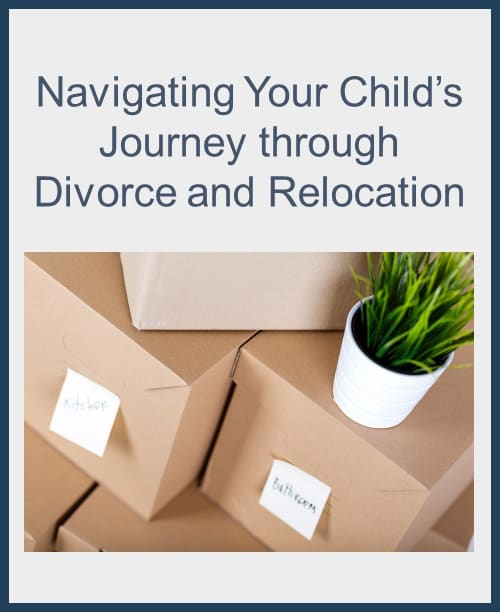[ad_1]
If you’re thinking about moving after divorce, especially if it’s a long distance, you need to consider the effect that it may have on your children. Many divorced women think that life will be so much easier if they don’t have to deal with their ex on a continuing basis. But take a minute to think about what such a move will mean for your children.
Below is a really good article that explores how children experience and react to the combined forces of divorce and moving.
Parental separation and then moving with child… far away
by Gary Direnfeld, MSW, RSW

When following a parental separation, a parental move with child far away from the other parent compounds one loss with another. First the child is subject to the loss of family as it was experienced and then there is the loss of the other parent. This is already much to grieve over.
A move far away, cleaves a child’s relationship with friends, loved ones, school and general community. Also gone are their activities and associations. A move simply disrupts and changes all of life, as previously known.
Reasons for relocating
Confounding matters is the circumstances of the move when following a parental separation:
- The move may be occasioned as the result of domestic violence to escape harm;
- the move may be motivated by a malicious desire to undermine or end the child’s relationship with the other parent;
- the move may be necessitated by economic reasons or other instrumental reasons such as housing, or social support;
- the move can be occasioned by any number of these and yet other factors.
As such, the child may be exposed to numerous other forces, impacting on their care and psycho-emotional well-being.
Behavioral issues that may arise
For the child, a move far away is akin to a social amputation. This necessitates all kinds of emotional, psychological, social, academic, recreational and practical adjustments to be made over the course of time in order to recover.
It is reasonable to expect the child in this situation to be anxious and/or depressed. Depending on the age of the child, these kinds of emotional reactions can present themselves as feeding and toileting difficulties, sleeping problems, withdrawn or alternately, defiant behavior.
School age children may find themselves having difficulty concentrating or focusing on academics. Their minds may wander and they may become disruptive in class. Overt behavior may bring them to the attention of teachers and other school officials. The child’s behavior may appear aggressive or alternately, the child may become the victim of taunting and teasing.
Consider your child’s disposition
Whether or not the parent anticipates the move far in advance and even if the move is a very good idea, this doesn’t mean that child will take to it well. From the child’s perspective, it can spell a very disruptive event with lifelong consequences. They may forever interpret the world as a hostile place with no internalized sense of control. Hence parents are well advised to strongly consider the disposition of their child and the necessity of the move.
Typically these children are coming to terms with the parental separation and changes in parental availability, usually determined by the parenting plan. The child is grieving the loss of the family and subsequent changes to the family and how they present their changed family to those in their world. This adjustment alone can take many, many months to years, depending on the complexity of the situation and conflict between the parents. The changes added to that by a disruptive move could undermine any success for reasonable adjustment.
If a parent is uncertain as to how moving after divorce may affect their child, they are advised to consider an assessment with a qualified professional experienced in separation issues affecting children. Planning for change may pre-empt a host of problems.
If you are thinking about moving after divorce with your children, the following articles will give you more insight on the subject:
Moving After Divorce – Legal Considerations
Relocation and Kids – Making It Work
Relocation and Child Custody FAQS
[ad_2]
Source link
